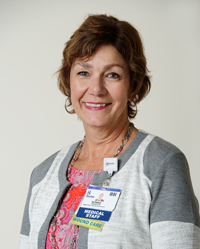Don't Ignore a Wound that Doesn't Heal
 As we age, we may have injuries that do not heal as well. It is important to have chronic or ongoing wounds checked by a doctor because they can lead to more serious problems.
As we age, we may have injuries that do not heal as well. It is important to have chronic or ongoing wounds checked by a doctor because they can lead to more serious problems.
If you have a sore or wound that has not healed in several weeks, it can be a red flag that there is something more going on. Sores can start small and create a scab, however when they break open repeatedly and do not heal, it is time to seek help.
Sign up for Diabetes health tips.
Types of chronic wounds:
- Diabetic ulcers. For those with diabetes, ulcers or sores can form on the legs or feet. If not cared for properly, these sores can lead to amputation. Diabetics may have neuropathy, which is a loss of feeling in the feet. This loss of feeling may allow wounds to go unnoticed. It is important for diabetics to regularly check their feet for sores. Diabetics are also at higher risk for infection. It is important to wear shoes that don’t create rubs or sores and to keep toe nails cut short to prevent injury. Maintaining your blood sugar levels is also key to reducing risk of infection due to sores.
- Poor blood flow. People with poor blood circulation in their hands and feet may notice it takes wounds longer to heal. Blood flow is necessary to allow the skin to repair itself, so if you know you have poor circulation, you want to be extra careful about injuries on your extremities. If you have an ongoing sore, you should talk to your doctor.
- Venous leg ulcers. People who have uncontrolled swelling in the legs can experience wounds that start because of the excess fluid in the legs. The wounds often weep which can prevent them from healing. Ongoing venous leg ulcers could require compression to help prevent swelling, weeping, and continued injury. If compression isn’t working, a vascular surgeon may also be consulted to determine the underlying cause of leg ulcers.
- Pressure ulcers. When pressure occurs regularly over a period of time, a pressure ulcer can form. Blood vessels can become compressed leading to sores. This is also common for those who are bed-ridden or who are in a wheelchair. The pressure leads to thickened tissue, which can cause skin death and large wounds.
Talk to your primary care physician if you are concerned about wounds that aren’t healing. Your physician may refer you to Beebe Wound Healing & Hyperbaric Medicine, located at the Beebe Health Campus near Rehoboth Beach on Route 24.
Beebe’s expert healthcare professionals will work with you to create an individualized care plan to help restore your skin and heal the wound. In addition to traditional methods, Beebe also has state-of-the-art hyperbaric oxygen therapy.
Hyperbaric oxygen therapy has been proven to increase oxygen concentration in the body, which helps fight bacteria, improve healing rates, and avoid loss of limbs in patients with diabetes, vascular disorders, or who have sustained serious trauma. It can effectively treat certain serious infections of soft tissue and bones, tissue and bone injured by radiation therapy and selected problem wounds such as diabetic foot ulcers and compromised tissue grafts or flaps.
For more information, go to www.beebehealthcare.org/wound-healing or call (302) 645-3121.

Bonnie Cunningham, GCNS-BC, CWOCN, is a Certified Wound and Ostomy Care Nurse. She is the director of Beebe Healthcare’s Wound Healing & Hyperbaric Medicine program. For more information about the program, call (302) 645-3121.
